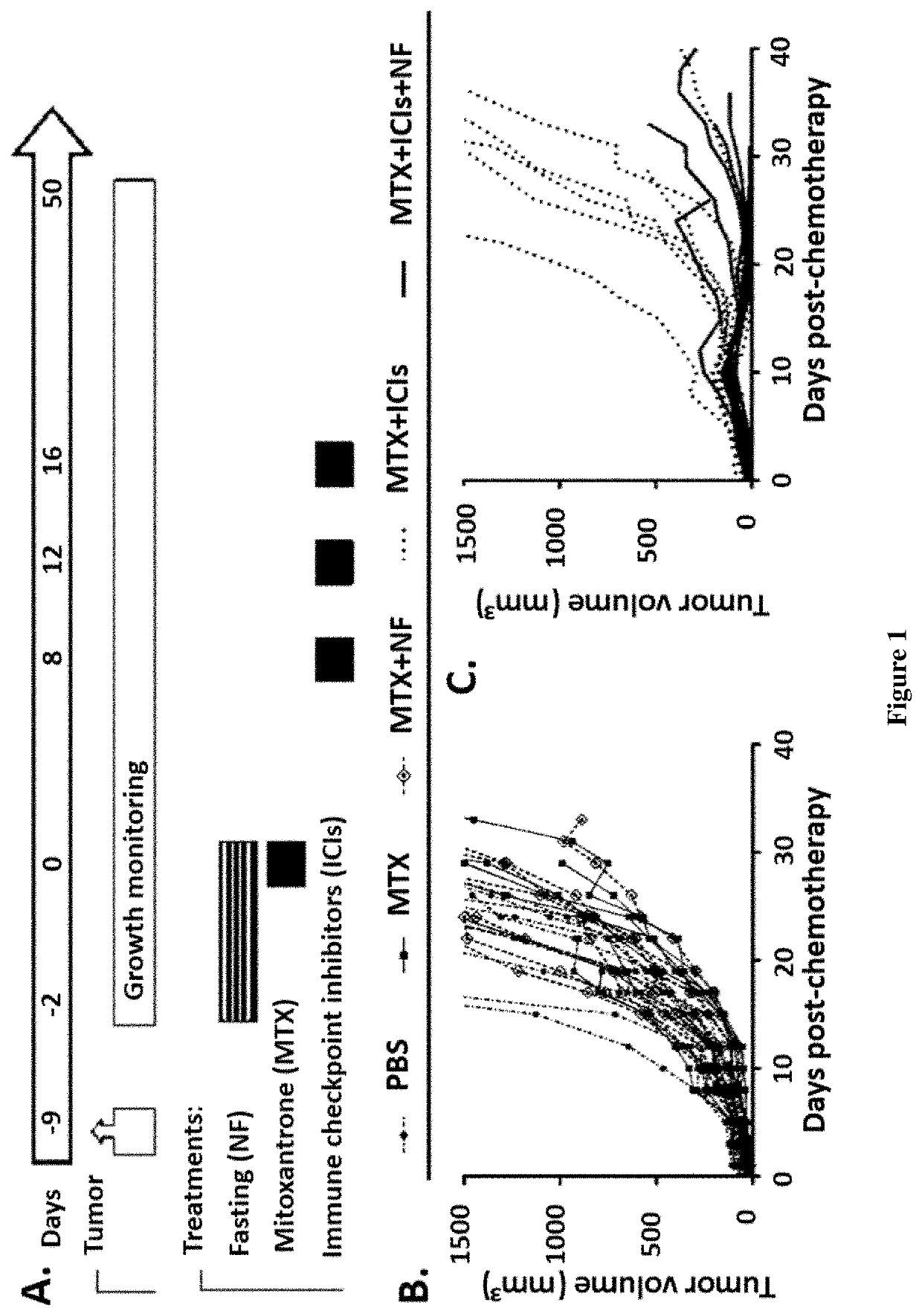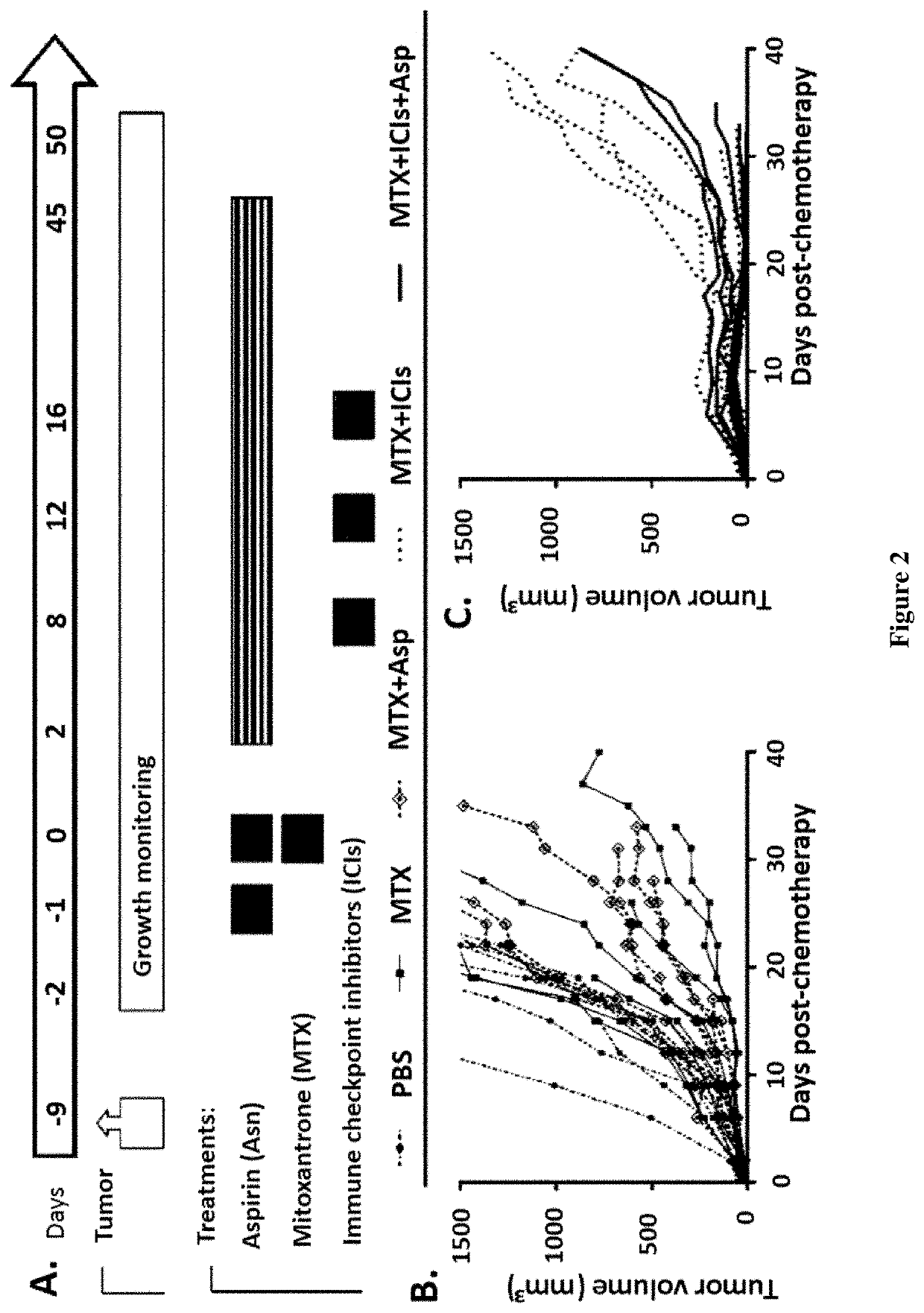Use of caloric restriction mimetics for potentiating chemo-immunotherapy for the treatment of cancers
a technology of caloric restriction mimetics and cancer, which is applied in the direction of immunoglobulins, peptides, drugs, etc., can solve the problems that the combination of chemotherapy and/or immunotherapy with caloric restriction mimetics has never been investigated, and not all tumors are responsive to ici-mediated therapy
- Summary
- Abstract
- Description
- Claims
- Application Information
AI Technical Summary
Benefits of technology
Problems solved by technology
Method used
Image
Examples
example 1
[0190]Immune checkpoint sensitization by the combination of chemotherapy and starvation. Immunocompetent mice bearing palpable syngeneic tumors (20 mm3 on average) developing in a subcutaneous location were first treated with systemic chemotherapy alone (mitoxantrone, MTX, injected intraperitoneally (i.p.), or PBS as a vehicle control) or in combination with a fasting regimen (48 hours, prior to chemotherapy) and then randomized in groups that either received immunotherapy (antibodies blocking CTLA-4 or PD-1) or isotype control antibodies, as indicated schematically in FIG. 1A. Tumor growth was monitored continuously. The combination therapy that yielded the most frequently tumor-free mice at the endpoint of the experiment (50 days after day 0 defined as the day of chemotherapy) consisted in the combined utilization of starvation, chemotherapy and immunotherapy. Complete responses leading to tumor eradication were either not seen at all or rare in any of the other groups (PBS contro...
example 2
[0193]CD11b blockade interferes with the anticancer effects of hydroxycitrate combined with chemotherapy. The combination of the progesterone analogue medroxyprogesterone and repeated DNA damage by gavage with 2,4-dimethoxybenzaldehyde (DMBA) is highly efficient in inducing mammary carcinomas when administered to young female BALB / c mice (Data not shown). In this model, the combination of mitoxantrone (MTX)-based chemotherapy and the CRM hydroxycitrate (HC) is highly efficient in reducing tumor growth and prolonging mouse survival (Data not shown), much more so than MTX and HC alone.26 These results were obtained in a ‘realistic’ setting in which treatments were started when the cancers could be diagnosed by palpation and hence reached a surface of 25 mm2. Of note, repeated injections of a monoclonal antibody (M1 / 70) that blocks CD11b-dependent extravasation of myeloid cells15 significantly interfered with the tumor growth reduction by HC+MTX (Data not shown). Very similar results w...
example 3
[0200]Further in vivo experiments are undergoing as hereinafter detailed.
[0201]In vivo experimentations. Tumor engraftment was performed through subcutaneous / orthotopic injection of XMCA205 / MC38 / PC3 / TC1 tumor cells (in 100 μl PBS) in the right flank / orthotopic place of the mice. Tumor volume was monitored using a digital caliper and calculated according to the formula: volume=length×width×height / 8×4 / 3 pi or by adequate imaging model (CT scan, PET scan, fluorescence imaging). When tumor reached 20 mm3 on average, mice underwent fasting (48 hours without food but ad libitum access to water) or were given caloric restriction mimetics (CRMs) such as, hydroxycitrate (HC; 5 mg / ml in drinking water daily), or were treated with mitoxantrone (MTX; 5.17 mg / kg i.p. in 200 μl PBS) Oxaliplatin, carboplatin+pemetrexed, Oxaliplatin+5 FU, or paclitaxel / Nab paclitaxel, or with the immune checkpoint inhibitors (ICIs) anti-PD-1 (10 mg / kg i.p. in 200 μl PBS) and / or anti-CTLA-4 (5 mg / kg i.p. in 200 μl P...
PUM
| Property | Measurement | Unit |
|---|---|---|
| concentration | aaaaa | aaaaa |
| durable responses | aaaaa | aaaaa |
| density | aaaaa | aaaaa |
Abstract
Description
Claims
Application Information
 Login to View More
Login to View More - R&D
- Intellectual Property
- Life Sciences
- Materials
- Tech Scout
- Unparalleled Data Quality
- Higher Quality Content
- 60% Fewer Hallucinations
Browse by: Latest US Patents, China's latest patents, Technical Efficacy Thesaurus, Application Domain, Technology Topic, Popular Technical Reports.
© 2025 PatSnap. All rights reserved.Legal|Privacy policy|Modern Slavery Act Transparency Statement|Sitemap|About US| Contact US: help@patsnap.com



